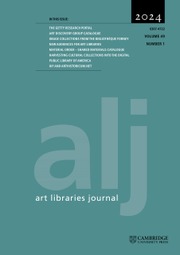Earlier this week, I came across an obituary for a librarian in the New York times. The obituary, which was featured prominently on the Times’ home page, was for Kathie Coblentz, the third-longest serving employee at the New York Public Library, who sadly passed at age 72.
I had not known of Ms. Coblentz or her work, but it appears she was a very interesting person who had many professional accomplishments over her 50-year career with the NYPL. According to the obituary, she was a cataloger, most recently working in the Miriam and Ira D. Wallach Division of Art, Prints and Photographs. She collaborated on books on cinema, and, in 2003, she authored The New York Public Library guide to organizing a home library. She was a polyglot, an editor, a blogger and was described as the “matriarch of our work family” by her supervisor.Footnote 1
The obituary itself, authored by NYt Obituary Reporter Sam Roberts, was a refreshing summary of the professional accomplishments of a librarian. Despite a popular culture that commonly ascribes members of our profession to basic caricatures, the author offers a full celebration of Ms. Coblentz's professional as well as personal accomplishments. He makes it clear that Ms. Coblentz was a dedicated information professional and a highly respected NYPL librarian. Could it be that a member of our profession was getting public recognition in the popular press as a highly educated, competent, professional who committed a lifetime to making a collection of information accessible to the public?
Although the obituary itself was a thoughtful account of an accomplished librarian's life, the headline, unfortunately, portrays the all-too-familiar perception of our profession. “Kathie Coblentz, 73, Dies; Not Your Ordinary Librarian,” it reads. It is followed by the subhead: “A Yankees fan, marathon runner, cinephile, editor, and, yes, a cataloger, she was the New York Public Library's third-longest serving employee.”
What a disservice to this librarian's legacy. As I understand the headline: although, “yes,” she was “a cataloger,” she apparently wasn't like the other “ordinary” members of that profession. The word “yes” in the subhead seems particularly problematic. It functions as a sort of reluctant acknowledgement. Not only does the subhead assume “ordinary” librarians don't like sports, movies or running, it seems to imply that being a cataloger is not something one should acknowledge in polite company. I'm trying to be generous, but I have a hard time reading it any other way.
The author of the article is almost certainly not responsible for the headline. Large newspapers usually employ editors and writers for the sole purpose of crafting headlines that will resonate with the public. In other words, in the estimation of the person who wrote that headline, the best way to get someone to read that article was to emphatically state how unlike other members of her profession Ms. Coblentz was. How sad for the legacy of such an accomplished librarian, and how sad for the profession to which she dedicated her entire professional life.
Ignorance of what librarians actually do goes far beyond newspaper headlines, and in this issue of Art libraries journal, Dr. Johanna Drucker discusses a related aspect of academic ignorance as it applies to our profession. In “Everyone a librarian!?”, Dr. Drucker addresses the popular misconception among academics that anyone with the advanced education, knowledge, and interest in a subject area should be able to manage a related collection as well as a librarian. After listing the “activities for which they simply had no background training and even more, no inclination,” Dr. Drucker discusses the history, culture and biases that form this all-too-common academic misconception of librarianship.
Also in this issue, we have three articles that were derived from papers presented at the 2020 Art Libraries Society of Australia and New Zealand biennial conference “Reimagining the material: Artists books, printed matter, digital transformation, engagement.”
In “We just aim to print well: The University of Sydney Library printer in residence,” Celia Brown, an Academic Liaison Librarian at the University of Sydney, explains why, when academic library space is scarce, the University of Sydney Library has dedicated a significant amount of it to maintaining an operating nineteenth century printing press and associated artists’ residency. Brown outlines the history of the press, the residency, and discusses the importance of the program for the library.
In “Sound in the archive: Media materials as archives of narrative,” Seth Ellis, a Senior Lecturer at the Queensland College of Art, discusses the idea of cataloging sound within an archive, making those sounds “better represented, more accessible, and more useable by the public.” Ellis discusses the grater idea of sound as a historical object and how it is unique among other “tangible” artifactual objects.
Finally, in “Shifting ground: A case study in researching an artist's collection,” Kerri Klumpp, a Librarian at the University of Queensland, looks at the differing methods used to investigate and interpret the Daphne Mayo Papers housed at the University of Queensland's Fryer Library. Klumpp looks at projects that utilized the collection over different time periods and through different methods.
I certainly hope that you enjoy this issue of Alj. I think it is an example of the wide scope of librarianship and a good reminder that term “ordinary librarian” is a popular fiction rather than a description of reality.


